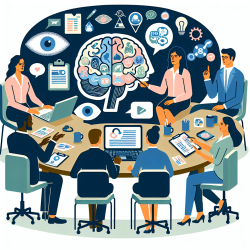The "Expert Group Meeting on Aphasia: A Report" provides comprehensive insights into aphasia, covering its prevalence, assessment, therapy, and rehabilitation. As practitioners in the field of speech-language pathology, leveraging these insights can significantly enhance our skills and outcomes for children with aphasia. Here are some actionable recommendations based on the report:
1. Emphasize Multidisciplinary Collaboration
The report underscores the importance of a multidisciplinary approach, involving neurologists, speech-language pathologists (SLPs), clinical psychologists, and other specialists. Forming interdisciplinary teams can lead to more holistic and effective treatment plans.
2. Implement Standardized Assessment Tools
Standardized and validated test batteries are crucial for accurate diagnosis and therapy planning. The report highlights the need for culturally and linguistically appropriate tools. Consider using or developing tools that adhere to rigorous psychometric and linguistic criteria.
3. Focus on Multilingualism
In multilingual contexts, assess all languages spoken by the person with aphasia (PWA). The clinical profile of aphasia can vary across languages, and therapy should be tailored accordingly. Cross-language code-switching is common and should be considered in assessments and interventions.
4. Leverage Technology for Tele-Therapy
The report advocates for the use of tele-rehabilitation and digital tools to extend the reach of therapy services. Platforms like Skype, Facetime, and WhatsApp can be utilized for remote therapy sessions, making it accessible to a broader audience.
5. Advocate for Awareness and Education
Raising awareness about aphasia among the public and healthcare professionals is essential. The report suggests creating educational modules and advocacy resources to disseminate knowledge and improve service delivery.
6. Conduct Further Research
Ongoing research is vital for advancing our understanding and treatment of aphasia. The report provides a comprehensive bank of research questions and outlines for young professionals to pursue. Engaging in research can lead to innovative solutions and improved patient outcomes.
Conclusion
By implementing these recommendations, practitioners can significantly enhance their skills and contribute to better outcomes for children with aphasia. For a more detailed understanding, I encourage you to read the original research paper, Expert Group Meeting on Aphasia: A Report.










